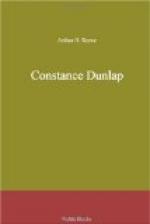“I must accept Stella’s invitation,” she said to herself excitedly. “At least, she should be put on her guard.”
That evening, as she was looking over the newspapers, her eye caught the item in the Wall Street edition:
RUBBER SYNDICATE DISSENSION
Break in Stock Follows Effort of Strong Minority to Oust Warrington from Presidency
Then followed a brief account of the struggle of a powerful group of directors to force Warrington, Braden, and the rest out, with a hint at the scandal of which every one now was talking.
“I never yet knew a man who went in for that sort of thing that lasted long in business,” she observed. “This is my chance—a crowd riding for a fall.”
Constance chose a modest orchestra seat in preference to the place in a box which Stella had reserved for her at the office, and, aside from the purpose which was rapidly taking shape in her mind, she enjoyed the play very much. Stella Larue, as the “Grass Widow,” played her part with a piquancy which Constance knew was not wholly a matter of book knowledge.
As the curtain went down, the audience, its appetite for the risque whetted, filed out on Broadway with its myriad lights and continuous film of motion. Constance made her way around to Stella’s dressing room.
She had scarcely been welcomed by Stella, whose cheeks beneath the grease paint were now genuinely ablaze with excitement, when a man entered. He was tall, spare, the type whose very bow is ingratiating and whose “delighted, I assure you” is suave and compelling.
Alfred Warrington seemed to be on very good terms indeed with Stella as she introduced him to Constance.
“You will join us, Mrs. Dunlap?” he asked, throwing an opera cloak over Stella’s shoulders. “Vera Charmant and Jack Braden are waiting for us at the Little Montmartre.”
As he mentioned the famous cabaret, Constance took a little tighter grip on herself and decided to take the plunge and see the affair out, although that sort of thing had very little attraction for her.
They were leaving the theater when she saw lurking in the crowd the familiar figure of Drummond. She turned her head quickly and sank back into the dark recesses of the limousine.
Should she tell them now about him?
She leaned over to Warrington. “I saw a man in the crowd just now who seemed to be quite interested in us,” she said quickly. “Can’t we drive around a bit to throw him off if he should get into a cab?”
Warrington looked at her keenly. It was quite evident that he thought it was Constance who was being followed, not Stella or himself. Constance decided quickly to say nothing more that would prejudice Stella, but as Warrington directed his driver to run up through the park she saw that, far from alarming him, the words had only added a zest of mystery about herself.




